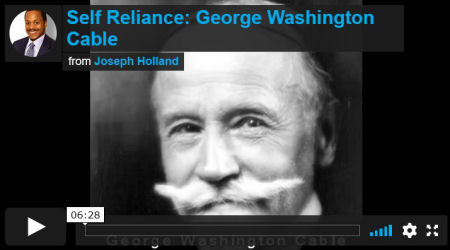
George Washington Cable
WORD OF THE DAY
PERSONAL CONTEXT
HISTORICAL CONTEXT
SUCCESS PRINCIPLE
CIVICS LESSON
Click below to listen to audio:
GO TO THE ROOT OF THE PROBLEM
The greatest social problem before the American people today is, as it has been for a hundred years, the presence among us of the Negro.
George Washington Cable
In 1885 former Confederate army soldier and writer George Washington Cable published “The Silent South”, in which he articulated his opposition to the Jim Crow culture emerging in the Southern states. In the first chapter of the book, Cable stressed the importance of going to the root of the problem.
We need to go back to the roots of things and study closely, analytically, the origin, the present foundation, the rationality, the rightness of those sentiments surviving in us which prompt an attitude qualifying in any way peculiarly the black man’s liberty among us.
Such a treatment will be less abundant in incident, less picturesque; but it will be more thorough. . . . as we could not find in our minds to blame slavery with this perpetuation, we could only assume as a further axiom that there was, by nature, a disqualifying moral taint in every drop of Negro blood.
He pointed to a unifying perspective as the way towards solving the problem. It is the first premise of American principles that whoever elevates the lower stratum of the people lifts all the rest and whoever holds it down holds all down. For twenty years, therefore, the nation has been working to elevate the freedman. It counts this one of the great necessities of the hour. It has poured out its wealth publicly and privately for this purpose. . . . colored seminaries, colleges, and normal schools dot our whole Southern country, and furnish our public colored schools with a large part of their teachers.
Cable’s writings generated so much hostility from his fellow Southerners that he decided to leave the South, moving his family to Northampton, Massachusetts. Though he suffered resentment for it, Cable’s approach was the right one. To solve a problem — whatever it is, personal or social — you have to go to the root of it. Go to the root of your own problems as you:
INHERIT
Treat the issue as your own. When you handle something as an inheritance, your perspective shifts from participatory to proprietary. Owning it will make you feel obliged to solve it, because you know it’s not going anywhere. And if the issue’s going to persist, it’s better to solve than to suffer with it.
INVESTIGATE
Do your research. As Cable stated, be “thorough”. This is where the rubber of personal responsibility hits the road. It’s up to you to find out what’s really going on. Probe, dig, delve beneath the surface to discover the root cause. You may have to do some google searches as well as take some inner roads that you haven’t traveled before. As you journey, keep in mind Albert Einstein’s insight.
Problems cannot be solved at the same level of awareness that created them.
INTERACT — There are times when you’ll need help to go beyond superficial assessments. Seek sound counsel, someone who can speak from relevant experience. Don’t be penny wise and pound foolish. If you have to pay something for expert advice, make the investment. The emotional return you’ll receive will justify the financial outlay.
INTUIT
Rational thought is important but there are times when you have to work things out by instinct. Putting your instincts into play means discernment — getting to those hidden things that others might have missed. Try to quell the external clamor so you can hear your inner voice.
INTEGRATE
Connect the dots. Put the pieces of the puzzle together. Overcoming deep challenges means reinterpreting the various factors so you can understand the whole truth. The wholistic approach could be the best — and only way — to see the entire picture and resolve things for good.
KEY POINTS
WORD OF THE DAY
Proprietary – of, relating to, or characteristic of an owner or title holder.
PERSONAL CONTEXT
Born in 1844 to wealthy New Orleans slaveholders, George Washington Cable served in the Confederate Army during the Civil War. After the war he became a journalist and writer of both fiction and nonfiction books as well as outspoken critic of the Jim Crow laws.
HISTORICAL CONTEXT
In the post-Civil War South, legalized racial segregation came to be referred to as Jim Crow laws. These laws forbade African Americans from living in white neighborhoods and forces them to use separate public facilities, phone booths, hospitals, jails and even different textbooks in different schools. Jim Crow endured almost 100 years, from the 1870s to the 1960s.
SUCCESS PRINCIPLE
See Success Principle Worksheet
CIVICS LESSON
See Civics Lesson Worksheet
*See George Washington Cable Video for more information


